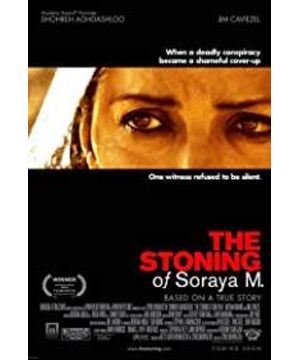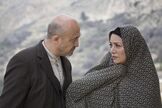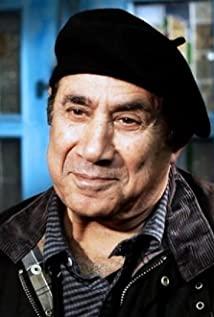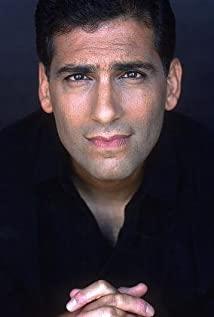The story takes place in Iran, and the film is distributed by the United States. It is inevitable that some people will doubt whether this is because the Americans want to exaggerate and slander Iran. In my opinion, such an idea itself is preconceived. Of course, American values cannot be called universal values, but it does not prevent it from showing the tragic reincarnation of a village from the perspective of its values, and allows the audience to use their own culture. To soften the value perspective of the background, let us discern the most basic value scale. The story is very simple, Soraya, a beautiful Iranian girl, married a careless, violent and controlling husband Ali. She is kind and has a great personality, which makes her live independent and lively. For the chauvinists in the traditional culture, women must be submissive, servile and submissive. The husband can spend his time outside and get drunk, and when he comes back, he can still slap his wife with a bruise. The village where Soraya lives is a typical society of acquaintances. The local elders have great power and maintain the local traditional order. Ali used all this to plan a "Soraya Incident".
It can be said that the "Soraya Incident" reflects the various drawbacks of a traditional order. The status of women is so low that they are not sure whether they will follow a considerate husband or an Ali-like demon in the film. The ancient traditional punishment of stoning is an extreme manifestation of this system. The order under the authoritarian system is bound to be full of corruption and fraud. Ali can rely on his strong position and the upper-level collusion to coerce others to testify and frame Soraya. Even according to the traditional penalty standards, this incident is wrong. , because Soraya himself did not commit the so-called "adultery" crime. Therefore, the unreasonable traditional punishment, the unjust charges, and the double mistakes make the rotten order in this seemingly peaceful village painful. As one of the parties, Soraya had almost no chance of appealing herself, and she could only go into destruction step by step in despair. Under the local traditional order, Soraya's death was inevitable. As a girl with a personality, a girl who dared to challenge her husband's power, her existence itself was an embarrassment that caused headaches for local men. Therefore, when Ali borrowed "adultery" When the crime of ” wanted to kill him, the traditional value maintenance mechanism of the village started to operate, efficiently and quickly collecting the charges, arresting people and throwing stones to death. And this kind of efficiency reflects the destruction of human nature and family affection by the so-called tradition. We see that the men in the film regard Soraya's case as a festival, and participate in it with great excitement. Almost immediately, guns were raised spontaneously, and the children began to look for stones everywhere, as if they were going to participate in a children's game. Soraya's father, in a tragic and solemn manner, wanted to draw a clear line of "righteous destruction of relatives".
Most heart-pounding is the climax of the tragedy, the stone-throwing scene, where Soraya is half-buried, ready to accept her final fate. In my opinion, this execution scene is more like the inheritance and reinforcement of distorted values. Relatives are required to throw stones first, and fathers need to throw stones at their daughters to prove that as an elder, he adheres to tradition and hates evil deeds. Soraya's two sons shouted tears and were asked to throw stones at their mothers. This bloody scene was their classroom. They were taught what kind of evil deeds they could kill even their own mothers. This cruel coming-of-age ceremony is tantamount to telling them that the mother can do this, and in the future, it can be the same for your sisters, wives, and daughters. Ali picked up his stone with peace of mind, to prove the dignity of a husband, the privilege of a man, that they can mutilate their wives in the name of the so-called lord, and that they can do whatever they want in the face of their wives. In this scene, the most complicated mood is the onlookers. They play the role of obedience. It can be seen that many of them are sympathetic and unbearable before Soraya's murder, but also show fear. They are the The real audience of a man's carnival, the purpose of punishment is to deter the essence, even Soraya's pungent and strong aunt can only beg powerlessly in the face of such deterrence, and her pleading cannot stop thousands of stones. Hit a poor woman. Soraya's aunt is a special character in the film. She is a narrator and a voice-over. She is the link between the scene and the audience (including the reporter who exposes the truth). In the film, she often reveals the essence of the local system. At the same time, the more sober she looked and the braver she acted, the stronger her sense of powerlessness and the stubbornness of the traditional drawbacks were. In this carnival, she was the one who made the tragedy appear even more powerful. Tragic living tragedy.
At the end of the film, Soraya does not appear to be a martyr who is not afraid of death. She is like ordinary people in fear and despair, and prays for help from the butchers who come up. And the stones quickly dispelled her illusions. The director of this scene showed his strength very well, showing the blood and cruelty in it, but he did not show the blood too much, but more about the performance. The madness of people, and the horror of seeing dozens of stones flying together from Soraya's point of view. And the most heart-wrenching thing is the child. Soraya's daughter still doesn't know what happened, and doesn't know that the fate of her mother will always be the butcher's knife suspended over her head. The two boys are even more complicated. In particular, the elder brother has shown resentment towards his mother. We can imagine what he will experience next. He will always feel that he is being laughed at by his neighbors because he has an adulterous mother. He resents his mother very much. It may develop into hatred, and even spread to contempt for all women. Under the teaching of my father, we will further strengthen the "common sense" of conquest of women, and become a person like Harry, a guardian of the traditional patriarchal order. The cruelty of his biological mother also achieved his goal, and the tradition was passed on, but the women could only knock out Soraya's horrific body from the scene, reluctantly giving her a peaceful place.
The men in the film held this bloody ceremony in a sacred manner, but they could not hide its ugly nature. Since it is "sacred", why do they try to cover it up in fear and try to prevent reporters from revealing it? The stones they threw at Soraya were ultimately thrown into themselves, into their own culture, their own traditions, their own civilization, their own country, and they were also scrutinized by others with blood and tears. will be changed. It can be said that judging from the local people's attempts to cover up the crime itself, it is a sign of optimism in the tragedy. After all, they are also aware of the ugliness of the world's mainstream values, and they can continue to say "this is the Western world. "Malicious distortion" to prevaricate and respond, but this is just a self-talking quibble. I believe that Iran's civilization and status quo are not completely dark. For example, in Abbas's film, we also see the joys and sorrows of ordinary people's ordinary lives, just like our lives. However, we also cannot forget the wounds of a country and civilization that Soraya's tragedy represents, and covering it up can only allow it to fester and expand, and ultimately affect the functioning and reputation of the entire body. Such wounds do not exist only in Iran, there are too many Local, habitual sins in the name of tradition await a more objective and rational approach.
http://hi.baidu.com/doglovecat/blog/item/bae5f1dccc1338adcd116693.html
View more about The Stoning of Soraya M. reviews











